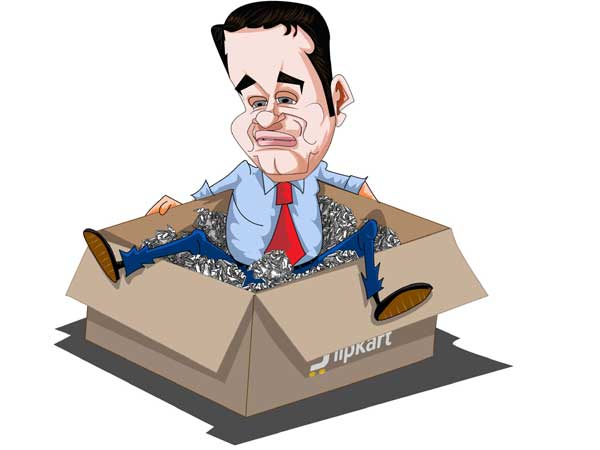
A quick resignation based on an “uncorroborated complaint of personal misconduct” marked the unceremonious exit of Binny Bansal, one of the poster boys of the start-up ecosystem. In the past one decade, each and every bit of action related to Flipkart and its promoter duo kept hitting the news headlines. There was no other company or promoter who reserved their regular space in the newspapers for such a long time.
It was not without reason. The Bansal duo was admired for proving that it was possible for 20-somethings to build a venture from seed capital as low as Rs 7 lakh and then take it to a $20 billion entity in a span of 11 years. It required a rare kind of fire in the belly. Binny Bansal and his friend Sachin Bansal showed that two youngsters armed with big dreams but no entrepreneurial experience yet could strike it out without the backing of a business family to teach them the tricks of the trade.
Binny was just out of IIT and had a brief stint at Sarnoff and Amazon before he joined hands with Sachin. As other IITians, he could have worked his way up the corporate ladder. But he was “bored” working with Sarnoff and understood that the company was not going anywhere. He found Amazon “riskier” than starting his own venture. Probably that made him different from thousands of graduates who graduate from engineering institutes every year. Yes, the friendship with Sachin too worked. Most importantly, both the Bansals found themselves at the right place at the right time – when the venture capital investors started their hunt for new innovative ideas in India after having missed the bus in China.
Zero baggage
They came with zero baggage, fresh thoughts, strong technical skills and a sharp entrepreneurial mindset. They were much younger than the founders of some of the e-commerce start-ups of the time and never shied away from working hard towards achieving their goals. The Bansals took pains to deliver the packets at the customers’ doorstep to understand market demand. Step by step they built the venture and came up with several bright ideas, including payment systems and cash on delivery that helped the e-commerce industry break several barriers. As COO, Binny kept a relatively low-profile and let Sachin do the talking. Still, both remained media-shy and very apprehensive about negative publicity.
As a start-up, Flipkart was a great place to work in. Several former employees assert that they loved working with a team which was dynamic, agile, lively, casual and open yet disciplined. Employees were at liberty to think freely and make mistakes and learn from them. Flipkart did not want to put its staff in a straitjacket.
Then the organisation started transforming into a corporate and the investors started asserting themselves in the day-today functions. The promoters also had cultural differences with the professionals they employed to manage their businesses.
The Bansals had given an assurance to staff that all employees would be treated by the same yardstick, but Flipkart saw hundreds of them being laid off. The “intuitive” Sachin understood that the winds were changing much earlier than the “rational” Binny. In 2016, when Sachin was removed from the post of CEO and replaced by Binny, the former became philosophical in saying that no one was indispensable in the company.
Once the Walmart deal was through, Sachin decided to call it a day. But, Binny chose to hang on. He took up the job of CEO when Sachin was removed and also the post of Group CEO after Walmart came in – only to be given an unceremonious exit just a few months after Sachin’s. For all that had made Binny important in the start-up eco-system in India, he deserved better. The company just gave a terse explanation full of clichés like “lapses in judgement’ and “lack of transparency” without mentioning the incidents that led to the resignation. The statement raised more questions than provided answers. That was enough fodder for the media to dig into their “source base” to get bits and pieces of information.
The past
As the story kept unfolding, it was reported that Binny had a consensual affair with a woman in 2016, four years after she left the organisation. The skeletons of a personal affair have come back to haunt him, much to his surprise. Even the employees heard about allegations of “serious misconduct” with much disbelief. The probe seemed to be a surprise planned for him as sources said he was not aware of it.
But he was planning to quit as Group CEO for some time, indicating his unhappiness in the operations of the company under the new management. For all those young entrepreneurs who viewed Sachin and Binny as a source of inspiration and dreamt of making it big with the help of venture capital and private equity firms, a wrong message has already been sent out.
For 36-year-old Sachin and 35-year old Binny, this could well be just the end of one innings. The promise they showed in an earlier journey suggests their best could be up ahead.





